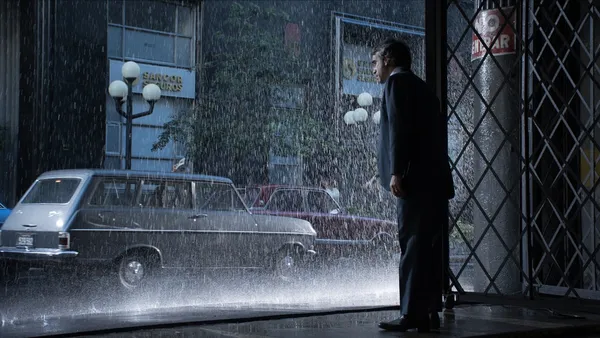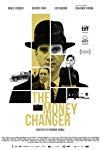Eye For Film >> Movies >> The Moneychanger (2019) Film Review
The Moneychanger
Reviewed by: Anne-Katrin Titze

Uruguay’s Oscar submission The Moneychanger (Así Habló El Cambista), directed by Federico Veiroj and co-written with Martín Mauregui and Arauco Hernández Holz, who is also the cinematographer, based on Juan Enrique Gruber’s novel Thus Spoke the Moneychanger, combines humour with terror in such a nonchalant way that it produces an idiosyncratic sentimental journey. Everybody, at one point or another, has had the experience of not knowing if the person they are dealing with is unaware, or hatching a devilish plan to undermine.
Although we begin our journey following Jesus through the desert, hearing that "evil started with money brokers", this is not a religious tale. Our hero Humberto Brause (Daniel Hendler, who gives the character a special flair by having his mouth slightly open most of the time) finds his way in the complicated, simultaneously banal and dangerous money business of Montevideo, starting in the Fifties, ending in the Seventies. As far as Brause is concerned, there always happens to be a mixture of both naiveté and greed, miscommunication and head-in-the clouds at once.

His first employer, by the name of Schweinsteiger (Luis Machín), shows Brause the ropes of 'wearing the vest' to bring money to Switzerland. He also has a daughter named Gudrun (a fantastically odd and convincing performance by Dolores Fonzi), who catches Brause's eye. Over cheese fondue, he explains to her that "all good things are stinky," and Gudrun, for the first of many times, doesn't take his misguided nonsense and orders something else. They end up marrying and having musically challenged but enthusiastic kids.
Left-handed forgeries, off-shore investing, a dangerous shopping trip to Buenos Aires in 1975, people with seven suitcases in their car, the funeral of an old prison mate, a tape with screams, extortion, torture threats - The Moneychanger leaps forward and backward in time. Greed, money and love, even Brause's hair seems stressed by the life he chose. Or has it chosen him?
Looking at the colours (production design by Pablo Maestre Galli), the entire film could be taking place inside a mushroom. Cigarette smoke penetrates almost every scene. The temperature is rising. Nightmare logic connects the historical dots: Montevideo 1975, money laundering, Bach Klavierwerke, a church choir, the Amazonas 1970, flute music on a boat.
Then there are the German names. We wonder, when did these families arrive in South America? 'Brause' is another word for “shower”, 'Schweinsteiger' includes 'pig' and 'climber'. The title of the novel is a variation on Nietzsche. When I talked with Federico Veiroj during the 57th New York Film Festival, he said the names were chosen for phonetic reasons. Their translations do add another dimension of menace, though. Humberto Brause and Adam Sandler’s Howard in Josh and Benny Safdie’s frenetic and polished Uncut Gems would have a great deal to commiserate about.
The Moneychanger ends with a most beautiful shot. Above a modernist house, through the autumn leaves, up and up the tree we reach the sky. All is well. A metaphysical calm settles over the terrible, terrible chaos of humans.
Reviewed on: 14 Jan 2020
















